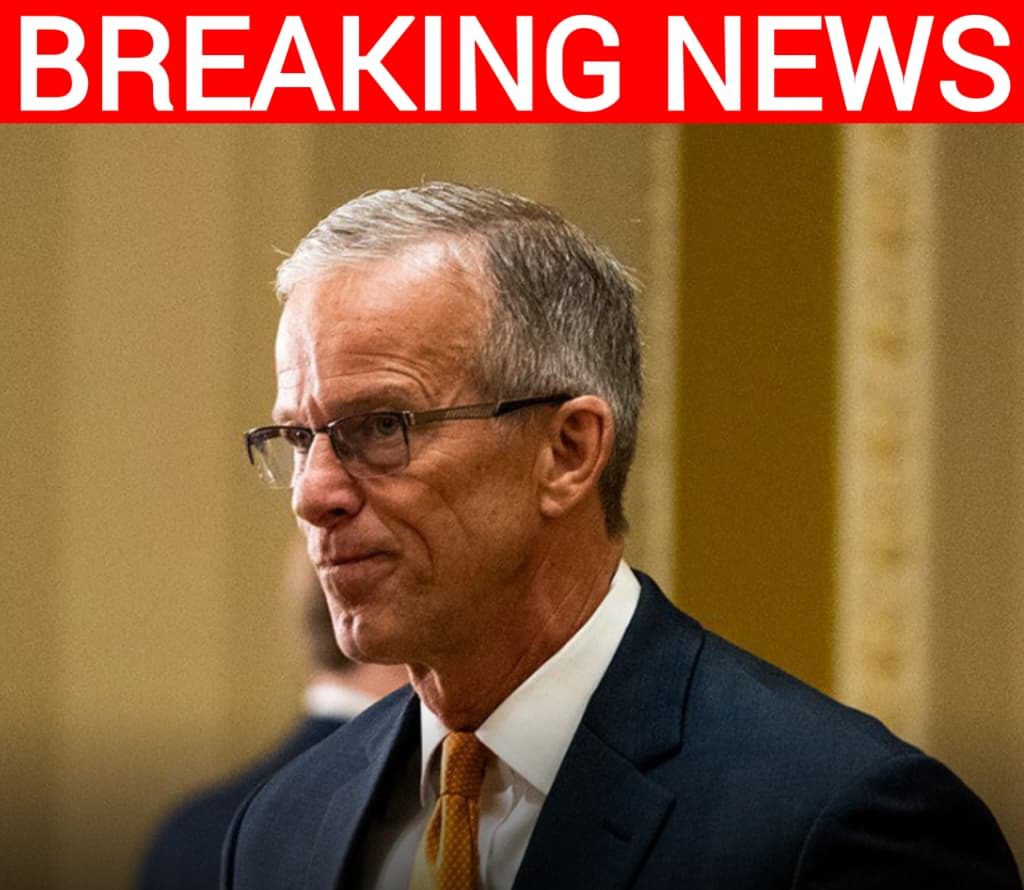Senator John Thune Stands Firm Against Chuck Schumer’s Obamacare Deal, Rejects Pressure to End 38-Day Shutdown Without GOP Demands Met
In a dramatic turn in Washington’s ongoing 38-day government shutdown, Senator John Thune has emerged as one of the firmest Republican voices refusing to bend under Senate Majority Leader Chuck Schumer’s mounting pressure. As federal offices remain shuttered and bipartisan frustration deepens, Thune’s office made it crystal clear this week: the South Dakota senator will not agree to Schumer’s latest offer to extend Obamacare subsidies as part of a short-term deal to reopen the government. For Thune, reopening the government must come first—then negotiations can begin. Anything else, he says, would amount to political blackmail.
“Cracks are forming,” one of Thune’s senior aides told reporters on Friday afternoon, echoing the sentiment now rippling through GOP ranks. “After 38 days, Democrats are beginning to abandon their unserious proposal. Extending the COVID bonuses is the negotiation — something that can only happen after the government reopens. Release the hostage. End the pain.”
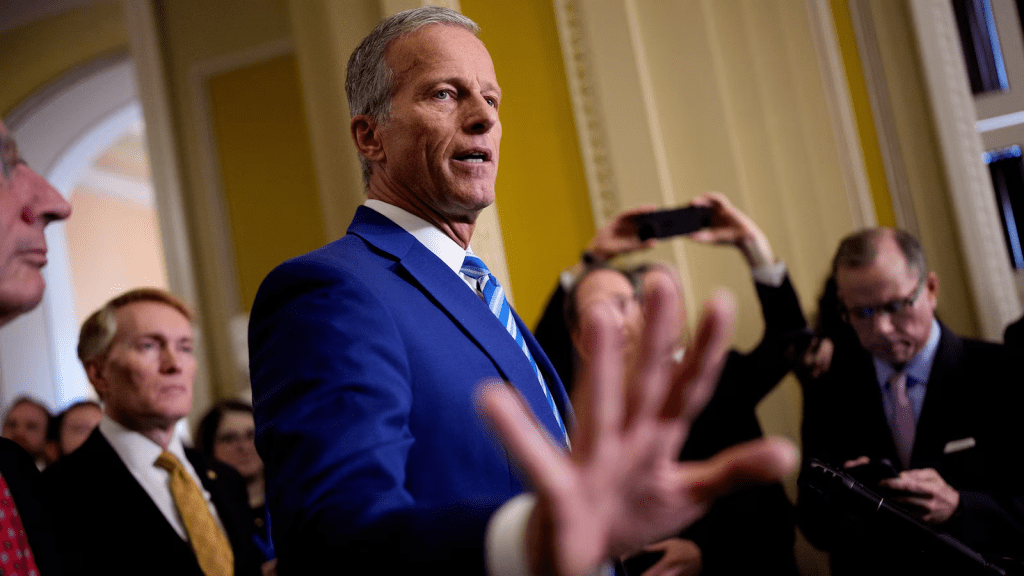
The statement landed like a thunderclap across Capitol Hill. It wasn’t just a policy disagreement—it was a declaration of endurance. Republicans, once accused of faltering under shutdown fatigue, are now framing their defiance as principle: a refusal to let Democrats attach partisan add-ons to a must-pass funding bill. The standoff, anchored around healthcare subsidies and COVID-era bonuses, has become the latest fault line in the struggle over fiscal restraint, executive overreach, and political gamesmanship.
According to reports from The New York Times and CBS News, Schumer’s proposal was designed as a compromise to lure moderate Republicans toward a deal. It offered a one-year extension of Affordable Care Act subsidies, which Democrats argue are essential to keeping premiums stable for more than 20 million Americans. The same enhanced subsidies, originally expanded under the Inflation Reduction Act, are set to expire at the end of 2025 — just months before the midterm elections. The timing has fueled Republican suspicions that the move was less about affordability and more about creating a campaign weapon for Democrats to wield next cycle.
Thune, known for his calm demeanor and pragmatic reputation, has long been considered one of the Senate’s institutionalists—a bridge-builder who prefers negotiation over confrontation. But in this showdown, he’s choosing conviction over compromise. His defiance marks a clear alignment with House Speaker Mike Johnson and the broader Trump-aligned GOP effort to strip out what they see as “election-year gimmicks” from federal spending packages.
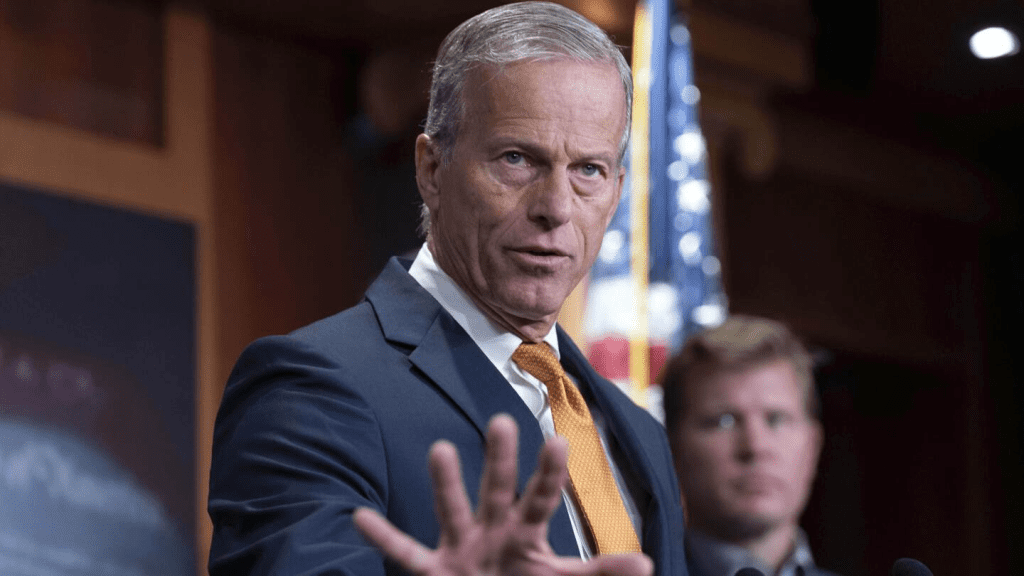
Inside Thune’s office, aides describe the mood as resolute, even defiant. “The senator believes the integrity of the process is at stake,” one aide said. “The government cannot remain closed forever, but it also cannot be reopened through extortion. Schumer is holding paychecks and services hostage to get what he wants politically. That’s not leadership — that’s leverage.”
For Democrats, however, the situation looks starkly different. They argue the Republican stance is punishing millions of Americans for political optics. Senator Patty Murray, a key Democratic negotiator, said late Thursday that the GOP’s refusal to consider the healthcare proposal “shows exactly who they’re fighting for — and it’s not working families.” But Thune and his allies counter that reopening the government should never be conditional on advancing unrelated partisan priorities. “We’ve seen this playbook before,” one senior Republican aide told reporters. “Democrats insert something they know is politically radioactive, then blame Republicans for not caving to it.”
What’s notable about Thune’s position is how closely it mirrors the approach of the Trump administration’s new fiscal team, particularly Treasury Secretary Scott Bessent and the Department of Government Efficiency task force led by Elon Musk and Vivek Ramaswamy. Both have championed cutting waste and ending “must-pass” spending traps that force Republicans into politically impossible positions. That philosophy now extends to the shutdown strategy.
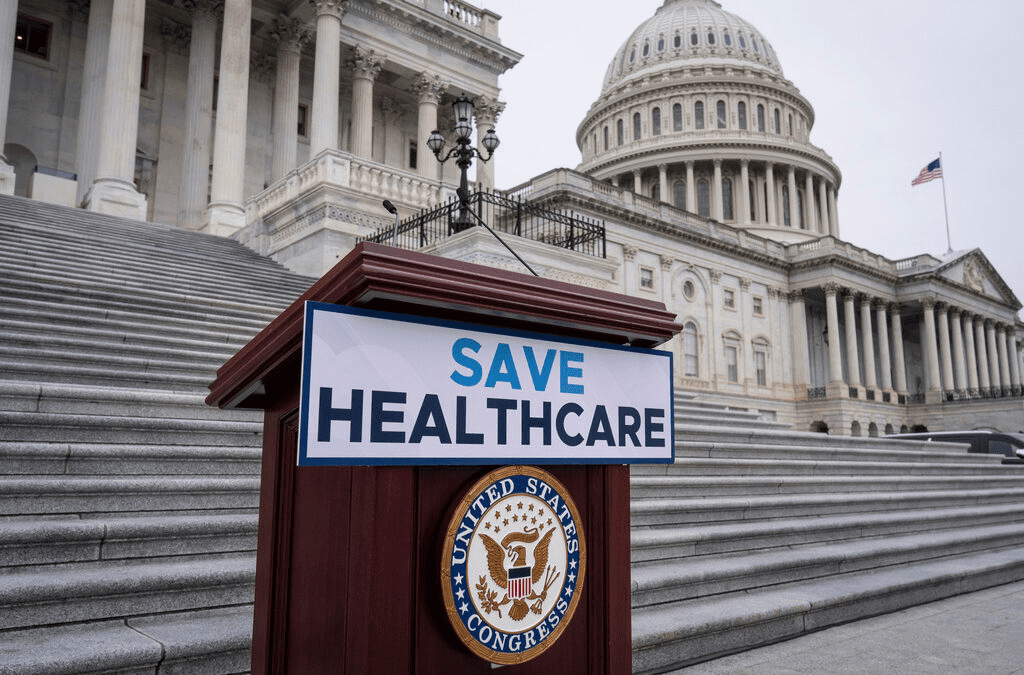
The Biden White House, by contrast, is ramping up its pressure campaign. Officials have warned that prolonged gridlock could delay pay for more than 2 million federal employees, affect food assistance programs, and slow defense operations. “This shutdown is unnecessary, reckless, and entirely avoidable,” White House Press Secretary Karine Jean-Pierre said. “The American people are paying the price for Republican obstruction.”
But inside the Senate, Republicans are increasingly confident that the tide is turning. As Thune’s office noted, Democrats have already begun walking back parts of their initial proposal. Earlier drafts tied multiple policy demands to reopening the government — from green energy tax credits to housing subsidies. Those have quietly disappeared from Schumer’s latest offer, leaving Obamacare subsidies as the final sticking point. “That’s how you know the pressure’s working,” said one Republican strategist. “Every day this continues, Democrats are forced to peel back another layer of their wish list.”
The GOP strategy — hold firm, reopen first, negotiate later — mirrors the playbook that helped Republicans in previous standoffs under Trump’s presidency. But this time, the tone is more disciplined. “There’s no shouting, no chaos,” said a former Senate aide who worked during the 2018 shutdown. “This is a different kind of fight. It’s calm, steady, and deeply strategic.”
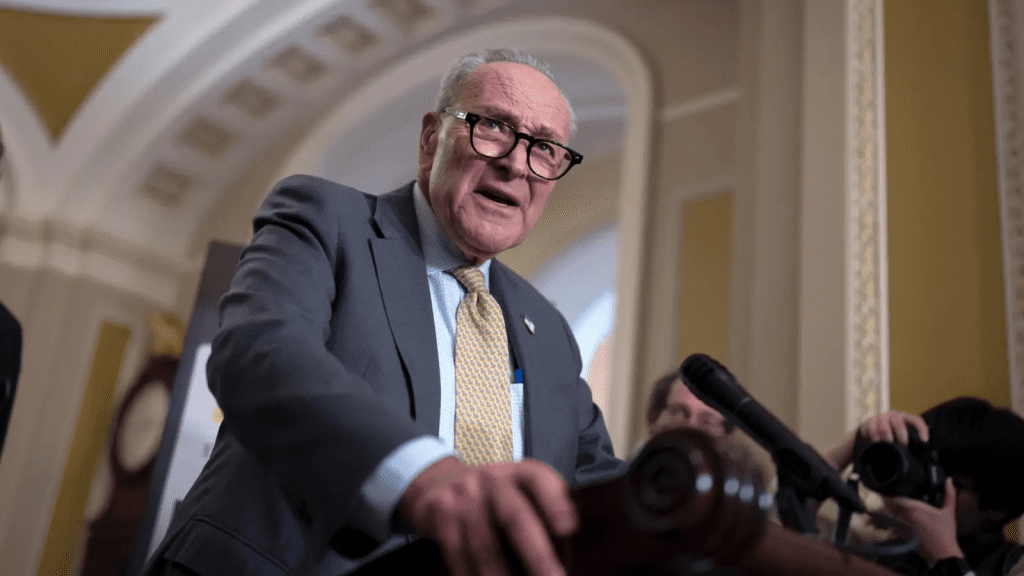
Thune’s remarks also signal growing unity within Senate GOP ranks, which had initially shown signs of division as the shutdown stretched into its fifth week. Senators like Susan Collins and Lisa Murkowski had publicly urged a compromise to reopen the government, while fiscal conservatives like Rand Paul and Mike Lee demanded deeper spending cuts. Now, Thune’s firm position has helped bridge that gap, giving moderates political cover and hardliners moral reinforcement. “He’s leading by example,” one aide said. “Even those who disagreed at first are rallying behind him.”
Meanwhile, on the Democratic side, the frustration is palpable. Schumer, facing pressure from both progressives and vulnerable moderates, is struggling to maintain unity. Some Democrats have begun quietly questioning whether it was wise to tie healthcare subsidies to government funding in the first place. “The optics are bad,” one Democratic staffer admitted. “It looks like we’re holding up paychecks over politics — even if we think the policy is right.”
For Republicans, that’s precisely the point. They’re framing the narrative around responsibility, portraying themselves as the adults in the room who want to reopen the government without extra conditions. “Thune understands the optics,” said conservative commentator Mollie Hemingway on Fox News. “He’s not just saying no — he’s saying enough. That’s a message voters respect.”
The shutdown, now the longest in modern history, has already reshaped the political landscape heading into 2026. Polls show the public evenly divided on who’s to blame, but GOP strategists argue that holding the line now will pay dividends later. “If Republicans cave on this, Democrats will use it every year,” warned one House Freedom Caucus member. “Thune’s standing firm because he knows once you start negotiating under pressure, you never stop.”
In South Dakota, Thune’s defiance has made him a hero among conservative voters who see him as standing up to what they view as Washington’s broken system. Local radio stations have praised him for “fighting the good fight,” and online conservative groups have dubbed his stance the “Thune Line” — a nod to Reagan’s famous “Line in the Sand” speech during the Cold War.
Despite the political theater, both sides quietly acknowledge that a resolution must come soon. Behind closed doors, staff-level talks have resumed to find a path forward, possibly involving a clean short-term extension of funding with a commitment to revisit healthcare negotiations later this year. But for now, Thune and his allies are holding the line, convinced that time — and public patience — are on their side.
“Senator Thune believes America deserves a government that works, not one that’s held hostage for political gain,” his spokesperson said late Friday. “We will reopen it — but we will do so the right way, with integrity and accountability.”
As the standoff grinds into its sixth week, the battle between principle and pragmatism continues to test Washington’s endurance. For John Thune, the decision to reject Schumer’s deal isn’t just about policy. It’s about precedent. And as the senator made clear, that’s one line he’s not willing to cross.
